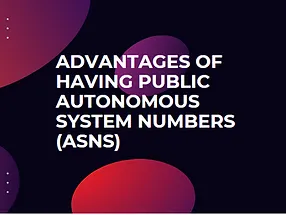Advantages of Having Public Autonomous System Numbers (ASNs)
Autonomous System Numbers (ASNs) play a crucial role in directing data traffic over the Internet. For data to reach their intended recipient on the Internet, it needs routing information. That’s where ASNs come in.
ASNs are 16-bit numerical identifiers are the foundation of routing information between Autonomous Systems (ASes) – networks controlled by a single entity, such as Internet Service Providers (ISPs) or large enterprises.
What Are Autonomous System Numbers (ASNs)?
An ASN distinguishes one AS from another. Each autonomous system (AS) is a network under the administration of a specific entity, and ASNs are the tools that allow routers to decide how to route data between them.
ASNs are assigned by one of the five Regional Internet Registries (RIRs) based on geographical regions:
– ARIN: North America
– RIPE NCC: Europe, Middle East, and parts of Africa
– APNIC: Asia and Pacific
– LACNIC: Latin America and the Caribbean
– AFRINIC: Africa
To obtain an ASN, you must contact the respective RIR. Be prepared to provide information about your network’s size and the services it offers. With an ASN in hand, configuring routers becomes possible. Consequently, it enables the exchange of routing information with other ASes and facilitating communication across the internet.
How Do ASNs Work?
The magic of ASNs lies in their ability to identify the source and destination of data packets. When a router receives a packet, it examines the ASN in the packet header to determine the next step – the next AS in the data’s journey to its final destination.
ASNs are necessary when establishing peering relationships between ASes. Peering enables two ASes to directly exchange traffic, bypassing third-party networks. This enhances performance and also cuts down costs, making it an attractive option for many organizations.
Why Are ASNs Important?
ASNs facilitate the quick and efficient selection of the best data path for Internet traffic. They also enable peering relationships that can optimize performance and reduce expenses.
For network operators, understanding ASNs is important. This will help them design proper routing and opens doors to valuable peering relationships with other ASes, for a more efficient network.
Advantages of Having a Public ASN
Your organization’s requirements determine if you need to get ASNs. There are many benefits that you can get from having a public ASN, including:
1. Routing Control:
ASNs grant more control over routing, allowing direct exchange of routing information. This is particularly useful if your organizations intends to manage its routing paths; because it gives you more control over how your traffic arrives to its intended recipient.
2. Peering Relationships:
Direct traffic exchange between two ISPs, for example, can boost performance and cut costs. ASNs are necessary to make such connection possible.
3. Regulatory Compliance:
Some local regulations require an organization to have ASNs, even for organizations with a single location. Please check your local regulations if such a requirement exists.
4. Network Security:
ASNs can enhance network security by making it tougher for attackers to spoof traffic. Having a unique identifier is an extra level of defense from spoofing attacks.
ASNs are not cheap and require technical skills to set up. The costs vary among Internet registries. The labor costs are not one-off either: ASNs need ongoing admin work. However, the potential benefits could outweigh the costs of ASNs. For example, improved security and routing control plus more efficient peering could offset your investment.
Closing Thoughts
ASNs, like IP addresses, are necessary to connect to the Internet. One of the threats that loom over businesses is the lack of control over these assets.
NRS is fighting for businesses to own the right to their IP addresses and assets like Autonomous System Numbers (ASNs). Join NRS in the campaign for a secure and prosperous future for businesses and organizations.



